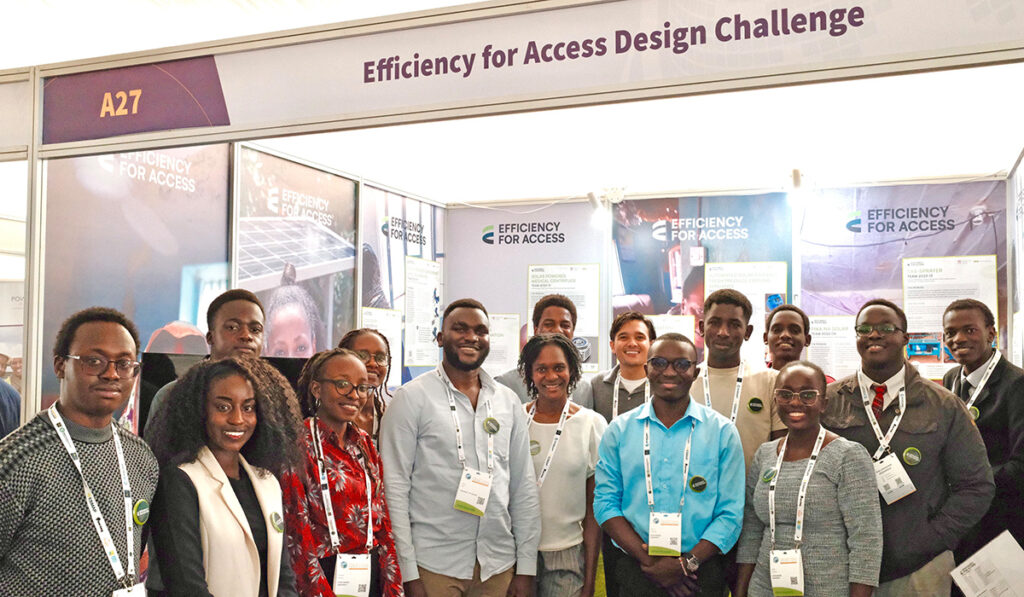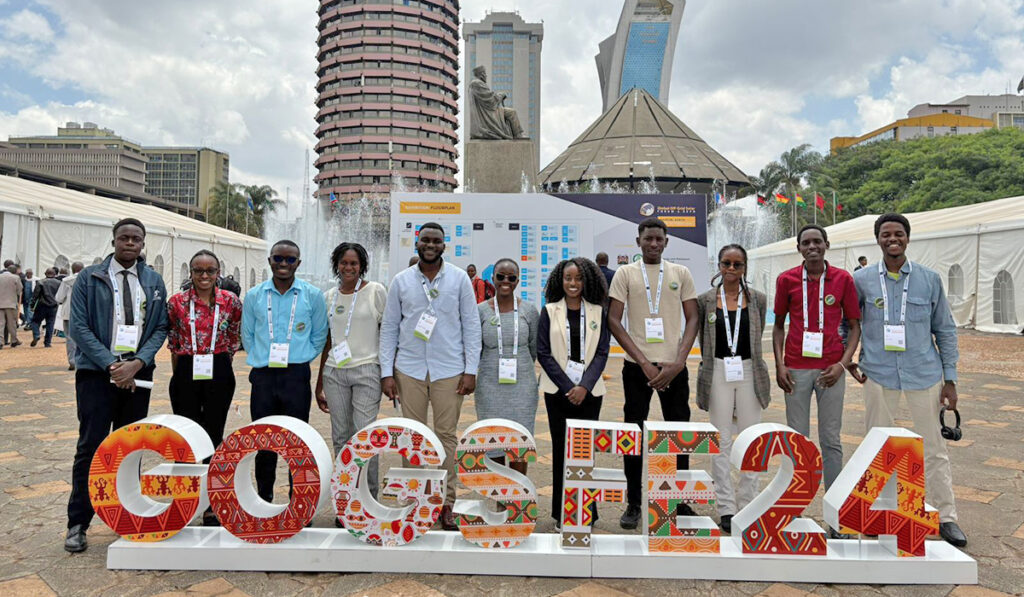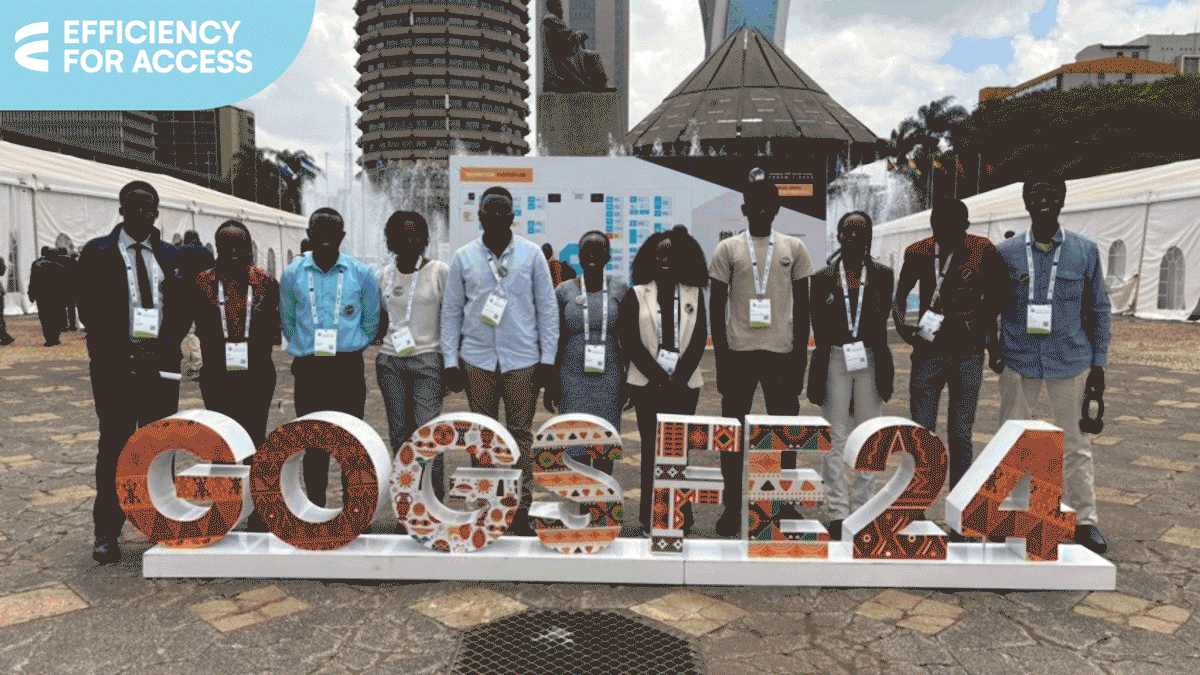Efficiency for Access Design Challenge Accelerator Programme: Celebrating innovation and welcoming its latest cohort
The Efficiency for Access Design Challenge Accelerator Programme, in partnership with Energy Catalyst, has successfully concluded its inaugural round, celebrating the innovative solutions developed by university students from around the world. This programme is part of the broader Efficiency for Access initiative, which aims to promote high-performing, affordable off-grid appliances to accelerate clean energy access.
The Challenge and Accelerator Programme
The Efficiency for Access Design Challenge is a global, multi-disciplinary competition that invites university students to create affordable and high-performing off-grid appliances and enabling technologies. The challenge is funded by UK aid from the UK government via the Transforming Energy Access platform and the IKEA Foundation.
Following an application process, selected teams from the Design Challenge are invited to join the six-month Accelerator Programme led by Energy Catalyst, where they receive tailored support to transform their innovative ideas into viable commercial ventures. This support includes technical and market expertise, business coaching, and access to funding awards of up to £10,000 should participants complete the course and meet the set criteria.

Celebrating the 2024 Awardees
The first cohort of the Efficiency for Access Design Challenge Accelerator Programme in 2024 has produced innovations aimed at addressing critical energy access issues. The awardees are:
- Joy Muntet & Vallary Shinaywa (Strathmore University, Kenya): M&S – developed an affordable smart solar irrigation system with soil moisture sensors to optimise water usage for small-scale farmers.
- Moses Alicwamu (Uganda): ASEI – created solar-powered UV-C LED systems for sterilising drinking water, targeting schools and healthcare facilities.
- William Mwai (University of Nairobi, Kenya): Solar Sip Africa – designed solar-powered kiosks that generate clean drinking water from atmospheric moisture for areas with limited water access.
- Angela Achola, Angeline Njuguna & Collins Mugwanga (Strathmore University, Kenya): PikaNaSolar – developed a solar-powered pressure cooker with an inbuilt battery for 24/7 clean cooking access in off-grid areas.
- Mika Sall, Amadou Ndiaye & Mamadou Faye (African Institute for Mathematical Sciences, Senegal) – created autonomous solar water filtration fountains providing clean drinking water in rural African areas.
When asked how awardees would invest the funding to advance their solutions, William Mwai from Solar Sip said: “I am going to establish my business and start on my entrepreneurial journey, which means I’ll be able to realise my dream. What I’ve found different about the programme is Efficiency For Access and Energy Catalyst are willing to take you through the whole journey if you show dedication. They want to see you prosper.” Joy Muntet from M&S said: “The accelerator programme has taught me how to do a needs assessment, how to build a business model, and how to budget for start-up projects. With the grant funding, we intend to set up two pilot funds and test the technological impact of our project on farmers and crop yield, as well as the impact on the wider community.”

As part of the programme, the cohort took advantage of invaluable opportunities to attend important climate and sustainability forums and expos. One such trip involved travelling to Nairobi, Kenya for the Global Off-Grid Solar Forum & Expo (GOGSFE) where three of our five teams in the cohort are based. Some also attended Sankalp Bharat 2024, hosted in Varanasi, India.
Asked about the GOSFE event, William said: “It’s been an eventful three days, I’ve learnt a lot. Day 1 was exciting because we got to meet industry experts like Koolboks – grantees from Energy Catalyst. I met financial analysts and discussed how to make my project more cost effective and technical teams who provided me with supply chain advice. The whole journey has been worth it and hopefully one day I will come back with my own stand sponsored by Efficiency for Access!”
Joy said: “It has been one of the highlights of my 2024. Hearing the stories of the start-ups has been inspiring and fascinating. We’ve heard about the real-life challenges companies faced when they spoke about their journey to profitability and the impact of covid on their projects. Now we have these real-life insights, we will factor challenges into our risk assessment.”
Speaking about Sankalp Bharat 2024. Vallary Shinaywa said: “It was a fantastic opportunity to discuss our concept with engaged visitors, receive valuable feedback, and gain insights into our value proposition, product positioning and pricing strategies. It was also great to share my experiences of participating in the Efficiency for Access Design Challenge with students from the local Banaras Hindu University.”

Looking ahead to the next cohort
In 2025, Energy Catalyst is proud to once again be leading the Efficiency for Access Design Challenge Accelerator Programme for its second round, building on the success of the 2024 cohort. This six-month programme will continue to support Challenge participants in transforming their innovative ideas into viable businesses. Participants will benefit from a comprehensive learning experience, including regular interactive sessions, tailored feedback, and access to experts in international development, clean tech innovation, and business coaching.
The new cohort is running from October 2024 to May 2025 and includes the following projects:
- Trevor Atela and Andy Onyango – Solar systems for hospitals using hydrogen as storage – addressing critical energy access needs in remote and underserved regions, where hospitals and medical facilities lack reliable power sources.
- Job Ian, Isaiah Ochieng, Ruman Hassan, Ronit Mepani and Emmanuel Sintila Lekatoo – Solar powered smart cereal dryer – combatting inefficiencies in drying and storing grain through a solar-powered cereal drying system that is gender-inclusive and environmentally sustainable.
- Augustin Nkundimana, Innocent Nsengimana, Rachel Uwagiriwubuntu and Jean Bonhuer – Smart automated fertilise and pesticide sprayer – leverages solar power, advanced sensors, and precision agriculture technology to efficiently and safely apply fertilisers and pesticides.
- Patrick Ndayisaba, Dushime Diedonne, Pamella Uwicyeza, Dushime Dieudonne, Divine Ishimwe Hatangimbabazi – Automated solar powered fresh produce cooling appliance – combines solar and evaporative cooling refrigeration systems to offer reliability, user-friendliness, energy efficiency, and effective produce preservation for small-scale farmers.
- Noah Midikira, Innocent Kheri, Anthony Muthiora, Stefan Mari – Solar powered fish preservation hub – includes a stand-alone solar system that powers both a refrigeration unit for fish storage and charging ports for lamps.
- Samuel Turahimana, Victorien Ukurikiyimfura, Dative Tushabomwe, Aline Gihozo, Francois Bizimana – Precision crop preservation with energy-efficiency and affordable solutions – tackles food insecurity by addressing significant post-harvest losses. By integrating innovative, sustainable energy solutions, the team aim to enhance the preservation of perishable agricultural products.
- Chipuriro Tafadzwa, Masanga Glynnly, Munorweyi Tukudzwa, Calvin Kuhuni – Solar lighting and pill management system – integrates DC lighting with a pill management system, designed to facilitate the timely intake of medication improving patients’ health outcomes and reducing healthcare costs.
- Morelife Zibaiwa – is developing a battery-powered lawn mower designed to operate independently of the electrical grid, making it ideal for off-grid and weak-grid environments.
- Simon A Musikavanhu, Leroy L Taderera, Terrance S Kanhanga – Solar DC bird deterrent device – protect crops from bird damage by employing millimetre-wave sensors to detect birds and deploy deterrent mechanisms powered by solar energy.
We look forward following the journey of this cohort and seeing the impact these technologies have on creating cleaner, more sustainable energy access for underserved communities around the world.
For information on the Efficiency for Access Design Challenge and the Accelerator Programme and other programmes, visit Efficiency for Access.